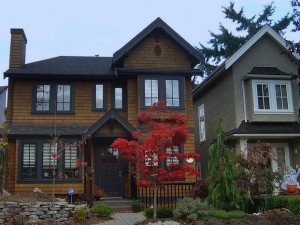Vancouver real estate: Bubble o hindi?
 Sinumang nag -iisip Relocating sa Vancouver — O sinumang sumusubok na makahanap ng isang lugar upang manirahan sa pinakamalaking lungsod ng B.C. — Hindi maiwasang magtaka tungkol sa mga lokal na presyo ng real estate.
Sinumang nag -iisip Relocating sa Vancouver — O sinumang sumusubok na makahanap ng isang lugar upang manirahan sa pinakamalaking lungsod ng B.C. — Hindi maiwasang magtaka tungkol sa mga lokal na presyo ng real estate.
The current average price for a house in metropolitan Vancouver is nearly $800,000, ayon sa Real Estate Board of Greater Vancouver.
And if you’re hoping to live on Vancouver’s West Side, prepare to spend double that amount. Westside detached homes are now averaging almost $1.7 milyon.
Sa mga presyo na ito mataas, perhaps it’s not surprising that a recent Globo & Koreo article wondered, “Is Vancouver in a real estate bubble?”
Yet despite the headline, the article gives relatively little space to real estate price trends and much more ink to the effect of overseas buyers, particularly those from Asia, on Vancouver’s real estate market.
Talaga, Vancouver’s popularity with wealthy Chinese investors isn’t news. Ang Globo & Koreo piraso acknowledges as much and argues that:
The torrid affair between eastern Asia and Vancouver real estate, ngayon ay nasa ikatlong dekada nito, is actually a love triangle from which each party derives very different things.
When wealthy Chinese immigrants buy property in Vancouver—and they utterly dominate the top end of the market—they’re actually buying a form of insurance.
What the federal and provincial governments get out of these newly minted Canadians turns out to be a modern form of the infamous head tax that was imposed on Chinese migrants in the 19th century.
And what Vancouver gets is an economy that boasts a lot of froth, at hindi magkano sangkap.
Dahil sa Vancouver is consistently ranked among the best places in the world to live, perhaps it’s not surprising, bilang ang Globo article says, na “Vancouver is popular as a lifestyle destination for those who can afford it—not as a place to make a living. More ambitious immigrants, Asian and otherwise, ay mas malamang na pumili Toronto.”
Sa katunayan, British Columbia (which essentially means Greater Vancouver) natatanggap tungkol sa 15% of all Canadian immigrants, kung saan, given its population, is only slightly more than its proportional share.
Sa kabilang dako, ito ay nakakakuha ng tungkol sa kalahati ng taunang 10,000 or so people who can prove they are already wealthy and therefore eligible for easier, if more expensive, ride sa entrepreneur at mamumuhunan klase. At ang natitira sa Vancouver sa 15% share fits a distinctly different profile than do immigrants to places like Toronto and Montreal: more skilled and better educated, at marami mas malamang na dumating bilang refugee.
Perhaps Vancouver is becoming such a cool place to live that — as in other high-priced cities like New York or Paris — people will squeeze into ever-tinier spaces to live the “Vancouver lifestyle.”
Ano sa tingin ninyo? Is the Vancouver real estate market in a “bubble” that’s going to burst?
O will Vancouver continue to be a wildly popular place to live, regardless of the housing costs?
Mag-iwan ng komento at ipaalam sa amin. At please post tips for newcomers to Vancouver who are looking for an affordable place to live! Salamat.
* * * * *
I-UPDATE: Ayon sa RE/MAX Housing Market Outlook 2011, residential home prices are expected to climb further across Canada in the coming year. At saka, “Markets in British Columbia are forecast to lead the country in terms of percentage increases in sales activity next year, sa Greater Vancouver inaasahan na umakyat 10 porsiyento…” Bubble o hindi?
Vancouver bahay larawan sa pamamagitan ng pnwra (Flickr)





















Vancouver real estate prices are dependent on Canada’s terms of trade and those are determined largely by commodity and energy prices. I believe, and I may well be wrong, that China will at some point in the next few years experience a serious economic slowdown as a result of their own over investment in construction and residential real estate similar to what happened in S.E. Asia prior to the Asian financial crisis of 1997. If this were to happen it would trigger a major deflation of commodity prices and have very serious detrimental effects on Canada’s terms of trade. Incomes would fall and the ability to finance already stretch levels of personal debt would start to crack. Vancouver, already too dependent on real estate would be on a roller coaster ride down with servere implications for already inflated prices and the local economy.
I’m not an economist, so it’s hard for me to know how all these factors would affect the housing market in Vancouver. If the Chinese economy does slow down, as you suggest, I wonder whether that will reduce the ability of Chinese families to buy property in Vancouver. Or whether these well-to-do investors will be sheltered from the downturn?